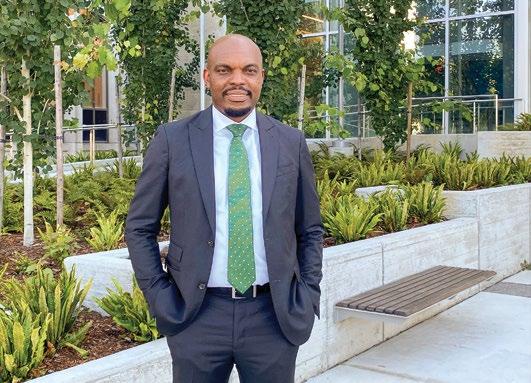
7 minute read
Profile
THE PEOPLE’S COURT
His childhood in Nigeria inspires Judge Edirin Okoloko ’03 to lead with respect and civility in Snohomish County
Advertisement
BY CLAUDINE BENMAR
When Judge Edirin Okoloko ’03 was a boy growing up in Nigeria, he dreamed of becoming a scientist like his father, a professor of molecular biology. But history intervened.
As a teenager, he watched the news in horror as the Nigerian military overthrew the government and installed a brutal dictatorship. He found hope for his country in lawyers, including the internationally lauded Gani Fawehinmi, who fought to hold the military accountable for its human rights abuses.
“That changed my mindset,” Okoloko said. “It turned me toward a passion for the law. I studied the cases and the lawyers.”
His appreciation of the importance of law was matched by a curiosity about the world, and he applied for the U.S. Diversity Visa lottery while a law student at University of Benin, in Nigeria. To his great surprise, he won the lottery. He secured a visa and immigrated to Seattle in 1999 after graduation, following a childhood friend who had immigrated the year prior.
Supporting himself with a full-time job selling men’s clothing, Okoloko enrolled in the law school’s evening program to earn a JD, choosing a second law degree in order to learn more about the U.S. legal system.
Given his life experiences, Okoloko naturally considered a career in international human rights law. “But sometimes life takes you in a different direction,” he said. Instead, he began his career in 2004 in Snohomish County as a law clerk for Judge Michael Downes ’82 (ret.). It was there that he discovered a meaningful way to honor the values that first sparked his interest in law, by maintaining a steadfast commitment to the constitution and rule of law.
Okoloko’s dedication to fairness was evident early in his legal career, said Downes. “He works so well with people because he’s thoughtful and respectful of everybody. I’m sure I learned as much from him as he did from me.”
After his one-year clerkship, Okoloko was recruited to the Snohomish County Prosecuting Attorney’s Office, where he served for 13 years. Gov. Jay Inslee appointed him to the Snohomish County Superior Court bench in 2018.
Okoloko believes that a judicial philosophy based on civility and respect builds faith in the legal system and helps people feel heard and comfortable in the courtroom. Similarly, he’s active in the court’s efforts to provide materials and services in languages other than English to make the legal system more inclusive.
“The Nigerian military ruled by decree, so the courts were ineffective. People were powerless,” said Okoloko. “With what I’m doing now, I’m giving people the protections afforded to them by the constitution that I found lacking when I was growing up. That’s what drives my quest for people to be treated fairly, with respect and with dignity.” Okoloko has engendered such respect among his peers that Inslee appointed him to the bench for a second time in January 2020, after he narrowly lost a 2019 election to retain his seat.
“Everyone who comes before the court deserves to be heard by a neutral, objective fact finder,” he said. “That’s what I strive to do every day. That’s what my oath requires.”

TAMING THE TECH GIANTS
BY JOHN B. KIRKWOOD
Attacks on the tech giants – Amazon, Apple, Facebook, and Google – have intensified and efforts to control the companies have begun. Congress is considering bills to restrict their behavior or break them up, and federal and state antitrust enforcers have filed multiple lawsuits. Numerous critics, from elected officials and small businesses to progressive advocates, contend that these corporate giants act like the robber barons of old, crushing competitors, exploiting consumers, and distorting the political process. Antitrust initiatives, however, must confront a tradeoff. On the one hand, the big tech firms dominate important sectors of the economy and have almost certainly engaged in anticompetitive conduct. On the other hand, their growth has been fueled in large part by the value placed on their products and services by millions of consumers. As a result, if antitrust actions are going to succeed, they have to be carefully targeted. Otherwise, the legal challenges may harm the very consumers they are supposed to protect.
The three most important antitrust initiatives focus on Google’s payments for default status,
Facebook’s purchases of emerging competitors, and Amazon’s favoritism of its own products.
Default status (Google). The Department of Justice and numerous states recently sued Google for paying Apple, Samsung, Dell, and many other manufacturers to select Google as the default search engine on their devices. As a result, the plaintiffs argue, Google monopolizes both general search services and search advertising, reducing choices for consumers and inflating prices for advertisers.
Google famously claims that it lacks monopoly power because “competition is only a click away.” But if default status has no impact on consumers – if they would readily switch to rival search engines – why does Google pay billions of dollars a year (allegedly $8-12 billion to Apple alone) for default status? Google’s payments, moreover, may be difficult to justify under the antitrust laws.
When firms such as Apple demand payments for default status, they are in effect auctioning off the default position on their devices to the highest bidder. That process would be good for consumers if the highest quality search engine normally won the bidding. But economics teaches that a firm with monopoly power has the incentive and the ability to outbid smaller rivals, even when those rivals offer better products.
Google’s conduct, therefore, may exclude competitors without benefiting competition or consumers, thereby violating the antitrust laws. A straightforward remedy would be to ban the payments and let consumers select their default search engine. That would increase consumer choice, and if rival search engines such as Bing and DuckDuckGo are truly superior, they would erode Google’s market share and power.
Emerging competitors (Facebook). Critics often charge that monopolies buy up emerging rivals to ensure that they never become effective competitors. The Federal Trade Commission (FTC) and 46 states sued Facebook on this very theory, alleging that Facebook acquired the immensely popular social media apps Instagram and WhatsApp to eliminate emerging threats.
There is no doubt that Facebook viewed these apps as a competitive danger. Looking at emerging social networks like Instagram, CEO Mark Zuckerberg wrote: “The businesses are nascent but the networks are established, the brands are already meaningful and if they grow to a large scale they could be very disruptive to us.” He warned that messaging apps like WhatsApp “are trying to build social networks and replace us.”
Despite Zuckerberg’s stated concerns, Facebook argues that WhatsApp and Instagram were unlikely to grow into full-scale social networks and that their success today reflects Facebook’s investments in them, not what they would have achieved on their own. And in any event, these apps are now integrated into Facebook and could not be separated without years of expensive reprogramming.
In June, the U.S. District Court for the District of Columbia dismissed both complaints, a stinging defeat for the FTC and the states. Without ruling on the merits of the acquisitions, the court held that the FTC had failed at a threshold step: it did not properly plead that Facebook had monopoly power. Likewise, the states’ complaint was barred by laches (which does not apply to the FTC) because the acquisitions occurred in 2012 and 2014, many years before the complaint was filed. Although the FTC can try again and the states can appeal, existing antitrust law does not make it easy to challenge the tech giants.
Self-preferencing (Amazon). As a law student, Lina Khan excoriated Amazon for using its online platform to crush small rivals. Now that she is chair of the FTC, it is widely expected that the agency will take action against Amazon. One avenue is to issue a regulation that prohibits Amazon and other big tech platforms from favoring their own brands over third-party products sold on their platforms.
In concept, a rule against self-preferencing is appealing, but it would be unprecedented and may not survive a reviewing court. The FTC has never issued a major competition rule in its entire 107-year existence, let alone one that attempts to control the largest firms in the economy. Moreover, the rule could be overly intrusive, since it would have to allow platforms to impose different terms on third parties if they were more difficult or more costly to serve. Yet that would require the agency to specify and police the permissible differences – an intervention that may be a bridge too far for a conservative court.
All three initiatives target areas of legitimate competitive concern. The alleged tech giant conduct may have excluded rivals without justification, injuring them and harming consumers and possibly workers in the process. But all three face skeptical courts and legal and practical issues. Professor John B. Kirkwood specializes in antitrust law and serves as an adviser to the American Antitrust Institute. His scholarly articles have received numerous awards and have appeared in top law journals.




